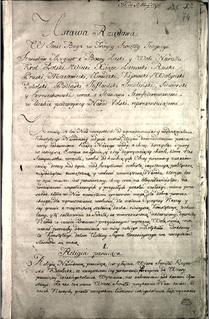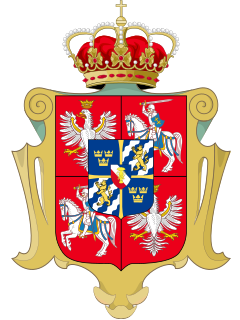The Polish People's Party is an agrarian political party in Poland. It is currently led by Władysław Kosiniak-Kamysz.

The Constitution of 3 May 1791, titled the Governance Act, was a constitution adopted by the Great Sejm for the Polish–Lithuanian Commonwealth, a dual monarchy comprising the Crown of the Kingdom of Poland and the Grand Duchy of Lithuania. The Constitution was designed to correct the Commonwealth's political flaws. It had been preceded by a period of agitation for—and gradual introduction of—reforms, beginning with the Convocation Sejm of 1764 and the ensuing election that year of Stanisław August Poniatowski, the Commonwealth's last king.

The Saeima is the parliament of the Republic of Latvia. It is a unicameral parliament consisting of 100 members who are elected by proportional representation, with seats allocated to political parties which gain at least 5% of the popular vote. Elections are scheduled to be held once every four years, normally on the first Saturday of October. The most recent elections were held in October 2018.

The Wilno Voivodeship was one of 16 Voivodeships in the Second Polish Republic, with the capital in Wilno. It was created in 1926 and populated predominantly by Poles with notable minorities of Belarusians, Jews and Lithuanians. Before 1926, the area of the voivodeship was known as the Wilno Land, it had the same boundaries and was also within the borders of Poland.

The liberum veto was a parliamentary device in the Polish–Lithuanian Commonwealth. It was a form of unanimity voting rule that allowed any member of the Sejm (legislature) to force an immediate end to the current session and to nullify any legislation that had already been passed at the session by shouting, Sisto activitatem! or Nie pozwalam!. The rule was in place from the mid-17th century to the late 18th century in the Sejm's parliamentary deliberations. It was based on the premise that since all Polish noblemen were equal, every measure that came before the Sejm had to be passed unanimously. The liberum veto was a key part of the political system of the Commonwealth, strengthening democratic elements and checking royal power and went against the European-wide trend of having a strong executive.

The Great Sejm, also known as the Four-Year Sejm was a Sejm (parliament) of the Polish–Lithuanian Commonwealth that was held in Warsaw between 1788 and 1792. Its principal aim became to restore sovereignty to, and reform, the Commonwealth politically and economically.
Elections in Poland refers to the election process as well as the election results in Poland. Poland has a multi-party political system. On the national level, Poland elects the head of state – the president – and a legislature. There are also various local elections, referendums and elections to the European Parliament.

The General Sejm was the bicameral parliament of the Polish–Lithuanian Commonwealth. It was established by the Union of Lublin in 1569 from the merger of the Sejm of the Kingdom of Poland and the Seimas of Grand Duchy of Lithuania, Ruthenia and Samogitia. It was one of the primary elements of the democratic governance in the Commonwealth. The sejm was a powerful political institution and the king could not pass laws without the approval of that body.
The Folkspartei was founded after the 1905 pogroms in the Russian Empire by Simon Dubnow and Israel Efrojkin. The party took part in several elections in Poland and Lithuania in the 1920s and 1930s and did not survive the Holocaust.
Mikołaj Sienicki of Bończa was a member of the landed gentry of the Kingdom of Poland. He held the office of chamberlain of the land of Chełm and was a notable politician of his period. Considered one of the best Polish political orators, he also held the title of marshal of the Sejm nine times. A Protestant, near the end of his life he became a member of the Polish Brethren and one of the major initiators of, and contributors to the Warsaw Confederation, which introduced new laws of religious tolerance in the Polish–Lithuanian Commonwealth, on a scale unimaginable in contemporary Europe.

The United People's Party was an agrarian socialist political party in the People's Republic of Poland. It was formed on 27 November 1949 from the merger of the pro-Communist Stronnictwo Ludowe party with remnants of the independent Polish People's Party of Stanisław Mikołajczyk.

The general election in the Republic of Central Lithuania was an election to the Vilnius Sejm (parliament) of the Polish-dominated Republic of Central Lithuania on 8 January 1922. The new parliament was intended to formally legalize incorporation of Central Lithuania into Poland. Such measure was fiercely opposed by Lithuania, which claimed the territory for itself. The election was boycotted by non-Polish population and its results were unrecognized by either the Lithuanian government in Kaunas or the League of Nations. The elected parliament convened in February and, as expected, voted on 20 February 1922 to have the Republic incorporated into Poland. At the end of March 1922, Central Lithuania became Wilno Land of the Second Polish Republic.
The Association of National Parties and Organizations was a right-wing electoral alliance of the political parties in the Republic of Central Lithuania. Following the 1922 general elections, it hold 43 seats in the Sejm of Central Lithuania, the most of all parties. It consisted of the Popular National Union, National People's Union, Christian National Labour Party, and Polish Nonpartisan Organization. It supported the incorporation of the Central Lithuania into Poland, and the transfer of the executive powers to the Legislative Sejm of Poland. Its leader was Witold Bańkowski.
Polish Nonpartisan Organization was a political movement of nonpartisan politicians, that operated in the Republic of Central Lithuania. It was part of the Association of National Parties and Organizations, which, following the 1922 general elections, holt 43 seats in the Sejm of Central Lithuania. It was represented by Wiktor Czarnowski.
The Popular Councils was a centre-left political party in the Republic of Central Lithuania. Following the 1922 general elections, it holt 34 seats in the Sejm of Central Lithuania, being the second most popular party. After the Peasant Group of Popular Councils broke away from the party, its numer of seats dropped to 27. Its ideology was the moderate radicalism, and it supported the incorporation of Central Lithuania into Poland. Its leader was Józef Małowieski.
The Polish People's Party of Wilno Land was a left-wing political party in the Republic of Central Lithuania. Following the 1922 general elections, it held 13 seats in the Sejm of Central Lithuania. Its ideology consisted of the agrarianism and agrarian socialism, and it supported the authonomy of Central Lithuania from Poland. Its leader was Bronisław Krzyżanowski.
The Democratic Party was a political party in the Republic of Central Lithuania. Following the 1922 general elections, it held 4 seats in the Sejm of Central Lithuania. It supported independence of the Sejm from outside influence, and demanded that it should held control over the state administration until the possible future unification with Poland. It believed that the idea of the federation with Poland, proposed by Józef Piłsudski, was impossible to organize at that time, and would have to be postponed for the future. Its leader was Witold Abramowicz.
The Popular Assosiation "Odrodzenie-Wyzwolenie" was a centre-left political party in the Republic of Central Lithuania. Following the 1922 general elections, it held 5 seats in the Sejm of Central Lithuania. Its political programme was identical to the one of Polish People's Party "Wyzwolenie" that operated in Poland, and was based on agrarianism and agrarian socialism. It supported the authonomy of Central Lithuania from Poland, however it did not oppose the possible future federation with it, as proposed by Józef Piłsudski. Its leader was Ludwik Chomiński.
Polish Socialist Party of Lithuania and Belarus was a left-wing political party, that was an autonomous branch of Polish Socialist Party, and which operated in Lithuania and Belarus in the late 1910s and early 1920s. Its political programme was identical with the one of Polish Socialist Party, and was based around left-wing nationalism and revolutionary socialism.
The Peasant Group of Popular Councils was a left-wing political party in the Republic of Central Lithuania. It was formed in 1922, by breaking out from the Popular Councils during the govermend cadency, and held 7 seats in the Sejm of Central Lithuania. It supported the agrarianism and agrarian socialism. Its leader was Adam Uziembło.







